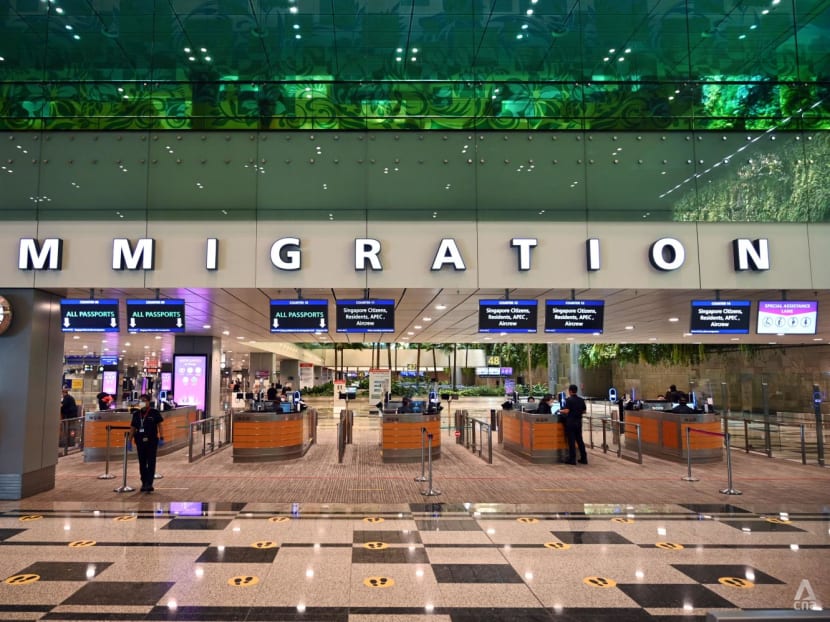Singaporeans hoping to return from US on VTL face challenges getting proof of COVID-19 jabs

A file photo of immigration at Changi Airport Terminal 3. (Photo: Marcus Mark Ramos)
SINGAPORE: When Singaporean PhD student Mr Chan, 46, read on Oct 9 that Singapore was extending its vaccinated travel lane (VTL) scheme to the US, he was delighted at the "great news".
Mr Chan, who only wanted to be known by his surname, will graduate from a US university in the southeastern state of Kentucky in December. So with an expiring visa after more than five years in the US, he needed to return home with his wife and two children.
He booked a designated VTL flight back to Singapore in December, thinking he would have no problems getting proof of vaccination as he had been fully inoculated against COVID-19 with vaccines recognised by the World Health Organization.
"But I had no clue at that point how difficult it was to get a SMART Health Card," he told CNA.
The digital SMART Health Card is the only form of vaccination certificate that Singapore accepts for travellers arriving from US on the VTL. It contains a person's clinical information, including vaccination history, and is issued by the states of California, Hawaii, Louisiana, New Jersey, New York, Utah, Virginia, Colorado and Washington.
The card comes with a QR code that needs to be uploaded on the VTL application portal before arrival.
But for those like Mr Chan who did not get inoculated in the eligible states, and given the decentralised nature of vaccination records in the US, there are several other hoops to jump through.
For instance, a select group of major pharmacy chains like Walmart or CVS Health could issue the card for those who got vaccinated there. Some private clinics that use an online medical record system called MyChart could do it too.
Since Mr Chan got his jabs at a clinic that did not use that system, he scrambled to find solutions online.
"I feel helpless, frustrated. We have not been able to go back to Singapore," he said, adding that he had planned to return in May to complete the remainder of his studies online, but was put off by the cost of quarantine in Singapore for a family of four.
"As a Singaporean, it makes us feel like we're lost. And now even with the VTL ... it's just setback after setback. There's like multiple, multiple levels."
Mr Chan is not alone in his experience. Several Facebook and Telegram users have posted in groups for Singaporeans in the US about similar issues.
The Singapore Global Network, a group under the Economic Development Board that grows Singapore’s overseas network by connecting with Singaporeans living abroad, told CNA it received fewer than five queries on the US VTL through its official customer enquiry channel.
Some of these people were vaccinated in the US but did not have the required proof of vaccination to apply for the VTL, so they felt "quite lost", a spokesperson said.
"Apart from sharing the latest official sources of information and Safe Travel helpline for support, we also help plug them into community groups specific to their region," the spokesperson added.
"These community groups, which comprise Singaporeans who are based overseas as well as those who have just returned, have been very proactive in offering help and advice to one another on such common issues faced."
But some have taken matters into their own hands and written letters to Singapore media, urging authorities to accept more forms of vaccine certificates.
"Having received both doses of the Pfizer-BioNTech vaccine through the University of Illinois in Chicago in March and April, I was profoundly dismayed to learn that Singapore will not be recognising my vaccination because I do not have a SMART Health Card," Ms Natalie Koh wrote in a letter published by TODAY on Nov 7.
"The restrictions are hurting many Singaporeans like me who wish to return home as soon as possible without the burden of serving a stay-home notice."
Similar to Ms Koh, PhD student Wilson Ong at Purdue University in Indiana got his shots at the school, and quickly realised that getting a SMART Health Card would be a problem.
"Because small health facilities like university healthcare would almost never be able to push out SMART Health Cards. We were given digital state records, but ultimately SMART Health Cards need to be on board by the states themselves," the 29-year-old told CNA.
Mr Ong emailed Singapore's Safe Travel Office, which handles administrative matters for travel to Singapore during the pandemic, on Oct 11 and later received what he called a "stock reply".
The email, seen by CNA, said Singapore only accepts the SMART Health Card by issuers in the United States and Canada.
"We are currently working on accepting digitally verifiable vaccination certificates by other issuers. Further details will be shared at a later date," it added.
STUMBLING BLOCK
Mr Ong also reached out to the Singapore embassy in Washington DC, which referred him to the Safe Travel Office, and pointed to suggestions in community groups to use a third-party paid service called VaccineCheck.
At that point, VaccineCheck was able to issue SMART Health Cards by verifying individual CDC (Centers for Disease Control and Prevention) vaccine cards – issued to vaccinated people in the US – and reviewing the records with respective state vaccination agencies.
Like Mr Ong, the PhD student in Kentucky Mr Chan tried this method and discovered that it worked. VaccineCheck was able to issue a SMART Health Card with QR code, and an official scan of this code confirmed the vaccine records were verified.
"So we bought our flights, thinking we had VTL rights. But this didn't work," Mr Ong said.
When Mr Chan tried the method for his family a week later, the QR code returned a "partially verified" status, meaning it would not be recognised by Singapore.
"I was like, 'Oh no, something is wrong.' That's how I started two weeks of just constantly trying different ways of getting the SMART Health Card," he said.
On its website, VaccineCheck said it is aware that as of Oct 27, its SMART QR issuer status is only partially verified.
"We need your support to strongly request that the Civil Aviation Authority of Singapore (CAAS) allow additional forms of US Based Verified Vaccination Records to be recognised and accepted for the VTL submission," the company urged on its website.
Mr Chan went to a local pharmacy that issues the SMART Health Card and pleaded that his vaccination be recognised and a card given to him. He even took a flu shot to see if his COVID-19 vaccination records could be imported into the system. He did not succeed.
He also considered getting another two doses of the COVID-19 vaccine at the pharmacy, but eventually decided against it.
A SOLUTION
Finally, Mr Chan came across an article posted on the Medium platform on Oct 14 listing several ways of getting the SMART Health Card.
One way was to find a local clinic that used the MyChart system, open an account with that clinic, submit vaccination records, and get that clinic to verify it before issuing the card.
After "a lot" of searching, Mr Chan found an eligible clinic in Kentucky a one-and-half hour's drive away and followed the steps. He managed to get the card for himself, his wife and 14-year-old daughter online without visiting the clinic.
But to avoid further complications upon arrival in Singapore and while out and about here, he plans to bring his 10-year-old son to the clinic to get his COVID-19 vaccine.
Mr Ong is also trying this method, but is unsure if he can get the SMART Health Card in time for his flight in early December, describing the process as "very patchy".
"In some states, it could be as simple as an online registration and a direct download from the state records," he explained.
But in West Lafayette, Indiana, where he lives, he said there appears to only be a single health service that uses MyChart.
This service requires an individual to call in, visit the clinic, request some medical services, and then get the clinic to manually update the person's vaccination records in the system.
"While I am still in the midst of doing so, I know a Singaporean who has successfully done it in West Lafayette, and is going home for Thanksgiving," he said.
Mr Ong said the whole process of trying to get a SMART Health Card has left him feeling "betrayed" as a Singaporean.
"(Singapore) seems to be overly particular over a QR code when the question at hand seems to be vaccination status," he added.
"The US has already quashed the idea of a federal-based vaccine record very early on. If the (Singapore) Government had envisioned this early on, more could have been done, if not in terms in policy, then in terms of communication to the Singaporean enclave that is living in the US."
Mr Chan said it would be useful if authorities put up an official one-stop FAQ on getting the SMART Health Card, particularly for Singaporean students in the US.
"If we have 500 students who are trying to get home this December, I mean, that's 500 individual efforts trying to find their own way of getting their vaccine passport," he said.
"I think just proper guidance for them will be very helpful. And I'm not sure how widely circulated that particular (Medium article) is. It's not on any official platform; it's just like a blog kind of thing."
BIGGER QUESTIONS
Nevertheless, Mr Chan said the experience raised bigger issues governments around the world can encounter when restarting air travel during the pandemic.
He recalled how his Indonesian friend returning from the US chose to get re-vaccinated in Indonesia to avoid the hassle of proving his vaccine status upon arrival.
"I think the problem is not just faced by our Government. It's faced by any Southeast Asian government whose citizens are returning home and were vaccinated in US," he said.
"And how are they going to prove their status? I think that's an issue that every country will have to kind of deal with."
Before the VTL scheme was launched, MP Shawn Huang (PAP-Jurong) asked on Jul 6 about plans for a global or regional immunity passport to ensure the authenticity of COVID-19 vaccinations for air travel and border control.
Transport Minister S Iswaran said in a written reply that Singapore actively participates in multilateral forums exploring the development of global or regional mechanisms to recognise vaccination certificates.
Singapore had also engaged in bilateral discussions with several countries on mutually recognising vaccination certificates, including setting up inter-agency bilateral working groups with these countries.
"This includes the exchange of public keys for the verification of digital certificates, and the exchange of specimen copies for the verification of physical ones," he wrote.
CNA has contacted CAAS, which handles the VTL scheme, for comment.
BOOKMARK THIS: Our comprehensive coverage of the COVID-19 pandemic and its developments
Download our app or subscribe to our Telegram channel for the latest updates on the coronavirus pandemic: https://cna.asia/telegram






